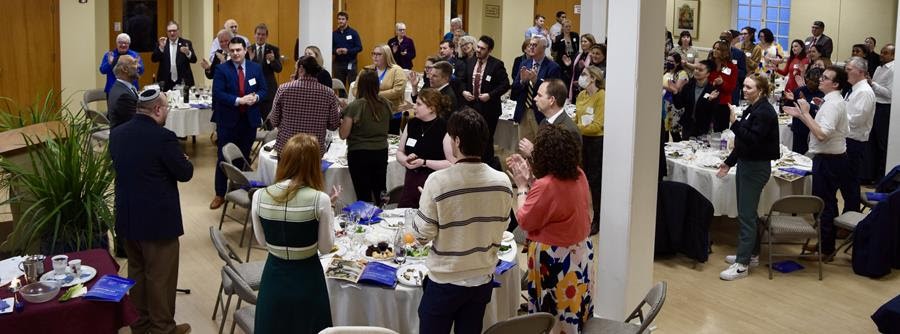JCRC Director's Note
Dayenu

April 4, 2023
On Wednesday, March 29, over 70 legislators, legislative staff, advocates, and Jewish community leaders gathered in Olympia for the Jewish Federation of Greater Seattle’s biennial Legislative Seder. People from many faith backgrounds heard the story of the Exodus that the Jewish people have retold for millennia, giving them a sense of the Jewish values that guide Federation and JCRC’s advocacy in Olympia.
At the Seder, I shared the following thoughts with the attendees:
 For over 25 years, the Jewish Federation of Greater Seattle has been advocating on behalf of our local Jewish community and Jewish agencies here in Olympia. Our priorities are set by our community members, who share what matters most to them. Our legislative agenda is driven by the needs of our local organizations and is rooted in our shared Jewish values—like seeing humanity and dignity in every person, striving to leave the world a better place, and pursuing justice.
For over 25 years, the Jewish Federation of Greater Seattle has been advocating on behalf of our local Jewish community and Jewish agencies here in Olympia. Our priorities are set by our community members, who share what matters most to them. Our legislative agenda is driven by the needs of our local organizations and is rooted in our shared Jewish values—like seeing humanity and dignity in every person, striving to leave the world a better place, and pursuing justice.
Advocating to combat antisemitism and other forms of oppression and hate, building a strong social safety net to care for the most vulnerable, and ensuring basic civil and human rights are protected for all, including immigrants and refugees, have become mainstays of our advocacy.
On the outside, it may not seem like our work has changed much in the last few years. On the inside, though, we’ve gone through a major transformation. I’d like to share a little bit about the re-creation of a Jewish Community Relations Council within the Jewish Federation of Greater Seattle, what this has meant for the Jewish community, and how it connects to our shared work.
The 2016 election ripped a hole in the fabric of our nation. Many of us believed that once the election was over, life would regain a sense of normalcy. Instead, the divisions that had festered over the prior months exploded. Since then, our country has become more polarized and divided than ever.
And though we are a small people, making up only 1 to 2 percent of the population, the Jewish community was no exception.
Between synagogues, individuals, and organizations, there were increased tensions, division, and even demonization. With rising levels of hatred and violence against the Jewish people, how are we to work together to address this growing external threat if we couldn’t even be in the same room together?
It was in this environment that the Jewish Federation explored how we could build a more cohesive and supportive Jewish community. Ultimately, over several years of careful consideration and development, we re-created the Jewish Community Relations Council of the Jewish Federation of Greater Seattle. The JCRC is a network of 33 local Jewish organizations and dozens of individual leaders who work together to advocate and support our local organized Jewish community on issues of vital concern.
We do this work through building consensus and respecting the diversity of thought and opinion among our people. Finding consensus is often painstaking work. But we pledge to begin with a question: Where can we find consensus? We don’t settle for asking if consensus can be found. And we learn techniques to deepen our ability to practice civil discourse.
Those who are part of the JCRC have joined because they believe that acting together is the only way to make a lasting impact. Even as we have our own specific perspectives and individual beliefs, we know that progress is only possible when we speak with a united voice.
Though the JCRC is still in its infancy with a long way to go, we have found that we can build stronger bridges, deeper respect, and more easily see humanity in one another when we make time to understand both our shared and distinct lived experiences.
The Hebrew word “dayenu” means it would have been sufficient. Dayenu is another way to tell the Exodus story.
If we had been brought out of the land of Egypt, and the sea had not been divided for us, dayenu.
If the sea had been divided for us, and had not been closed upon the Egyptians following on our heels, dayenu.
And so dayenu goes until the Jews emerged on dry land and were sustained in the desert for 40 years. We’re given the Sabbath day for rest, celebration, and glimpse of the promised land.
As my family’s Haggadah (Because We Were Slaves) says, “This traditional recitation urges us to celebrate each victory as if it were enough, and then to start out fresh and work for the next one. It cautions: If we reject any one step because it does not achieve the total goal, then we will never succeed. Then it challenges us to never be satisfied with short-term accomplishments.”
Our 60-second news cycle demands quick action and quick results. But the legislative process and the JCRC do not lend themselves to this model.
It takes courage in today’s day and age to not have all the answers, to not jump to conclusions, and resist pressure to reach for immediate solutions to difficult problems.
Change can be longer lasting and more effective if we work together to build understanding and address issues thoughtfully, rather than making unilateral or drastic changes that might feel good in the moment but may not be sustainable in the long run.
As we try to do our work, often against the tide of immediacy against the pressures, we can all draw inspiration from dayenu—it is sufficient. By working diligently together, step by step, we can and will enact lasting and meaningful change.
So relish in and celebrate every cut-off and vote, every discussion and hearing, and every constituent meeting and bill signing as small victories to be recognized. Gather your energy and keep working across the aisle, across chamber, and across communities, hand in hand, step by step. Dayenu.
Chag Pesach Sameach,

Max Patashnik
Director of JCRC and Government Affairs


